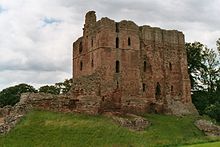Thomas Grey (chronicler)
| Sir Thomas Grey | |
|---|---|

Norham Castle
|
|
| Died | before 22 October 1369 |
| Spouse(s) | Margaret de Presfen (Pressene) |
| Children | Sir Thomas Grey Elizabeth Grey Agnes Grey |
| Parent(s) | Sir Thomas Grey Agnes de Bayles |
Sir Thomas Grey or Gray (d. before 22 October 1369) of Heaton near Norham, Northumberland, was the son of Sir Thomas Grey, an eminent soldier in the Anglo-Scottish wars in the reigns of Edward I and Edward II, and his wife, Agnes de Bayles. He was the author of the English chronicle, the Scalacronica.
Sir Thomas Grey, author of the Scalacronica, was the son of Sir Thomas Grey of Heaton (d. before 12 March 1344) and his wife Agnes de Bayles.
Grey had four sisters, who according to King married John de Eure, William de Felton, William Heron, and Gerard Salvayn, 'all eldest sons of prominent knightly families'.
Grey's father served almost continuously during the Anglo-Scottish wars in the reigns of Edward I and Edward II. In May 1297 Grey's father was left for dead on the field when William Wallace attacked Lanark, killing the English sheriff, William de Heselrigg, but recovered, and was active in various campaigns in the ensuing years. In May 1303 the elder Grey was captured by the Scots at Melrose Abbey, and after his release was at the siege of Stirling Castle the following spring, where he effected a dramatic rescue of Henry de Beaumont, with whom he was closely associated for much of his career. Later, at the Bannockburn, Grey's father was taken prisoner by the Scots in a skirmish on 23 June 1314, the day before the main battle. He was constable of Norham Castle from 1319 to 1331, resisting two lengthy Scottish sieges there, and appears to have died shortly before 12 March 1344.
Grey had already been knighted before his father's death, and according to King, likely served in Scotland alongside his father in the 1330s, and may have had his first experience of war in August 1332 as part of a private expedition into Scotland mounted by a group of noblemen and gentry known as the 'Disinherited', which culminated in a battlefield victory at Dupplin Moor.
...
Wikipedia
